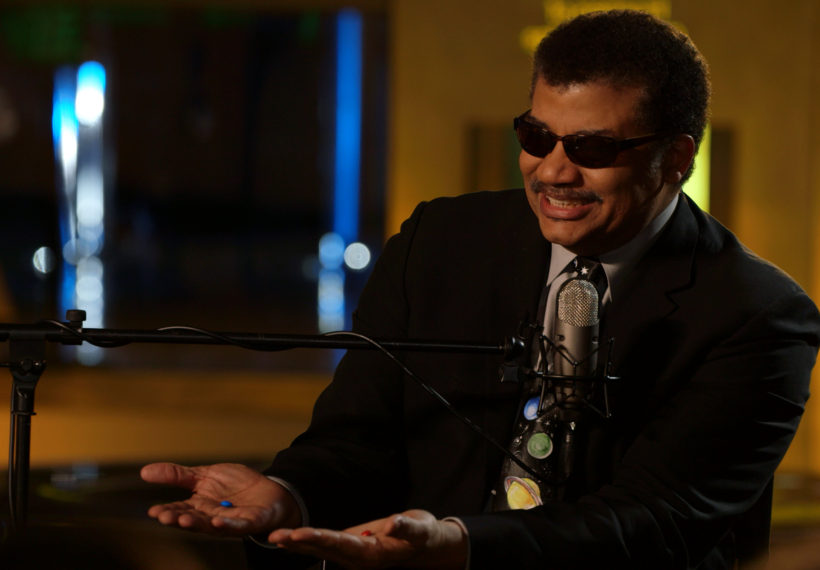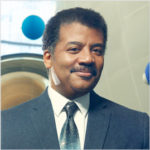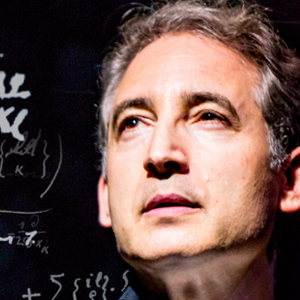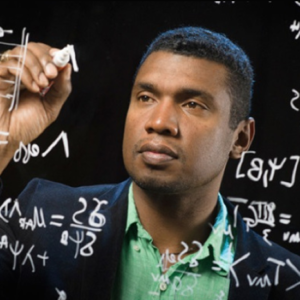Is our universe just an incredibly complex computer simulation? Or is it just one of many universes, each brought into existence by the choices we make? In this episode of StarTalk Radio, Neil deGrasse Tyson investigates the nature of reality, from quantum physics and string theory, to the multiverse and The Matrix. To grapple with these questions, both very big and very, very small, Neil interviews his friend, theoretical physicist Brian Greene, while in studio, he gets help from co-host Maeve Higgins and David Chalmers, who is a Professor of Philosophy and co-director of the Center for Mind, Brain, and Consciousness at NYU. Discover why the multiverse concept makes mathematical sense, at least through the lens of quantum physics. You’ll hear how Schrödinger’s Cat can be simultaneously both dead and alive and why Planck’s Constant has changed our understanding of how reality plays out on a quantum level. You’ll learn about the “simulation hypothesis”: that we are all living in a computer simulation, and why any evidence to the contrary (or glitches in the matrix) could be part of the simulation, too. Find out what Gödel’s incompleteness theorem says about the complexity of that simulated universe, and why the idea that we are all characters in a game designed by a pimple-faced 15-year-old from the future may be more in line with the laws of physics than the idea of a creative god. Finally, explore the relationship between physics, string theory and music with Stephon Alexander, who is both a theoretical physicist and a musician. Plus, Chuck Nice heads to the streets to find out what the people know about theoretical physics, and Bill Nye ponders what life as a sim would be like.
Transcript
DOWNLOAD SRT
Welcome to StarTalk, your place in the universe where science and pop culture collide. StarTalk begins right now. Welcome to the Hall of the Universe. I'm your host, Neil deGrasse Tyson. I'm your personal astrophysicist. And tonight, we are featuring...
Welcome to StarTalk, your place in the universe where science and pop culture collide.
StarTalk begins right now.
Welcome to the Hall of the Universe.
I'm your host, Neil deGrasse Tyson.
I'm your personal astrophysicist.
And tonight, we are featuring my interview with bestselling author and theoretical physicist, Brian Greene.
He is an expert on all manner of weird physics phenomenon, especially in quantum physics and in cosmology.
And I picked his brain on everything from the multiverse to the matrix.
Is our universe a simulation?
Let's do this.
And as you know, I never do this alone.
I've got my comedian co-host Maeve Higgins.
Maeve, welcome back to StarTalk.
And you're still growing accustomed to being in America, being a native of Ireland.
Yep.
Yeah, but I like your observations of America because they, the things we forget to notice.
Yeah, now I'm worried you're gonna tell me there's a whole other universe that I have to get used to.
You gotta get jokes for that universe, right.
Also to help me out here is Professor of Philosophy, David Chalmers.
David, welcome.
And at New York University, you not only philosophize, you're also co-director of the Center for Mind, Brain, Cognitive Brain, Minds?
Mind, Brain and Consciousness.
And Consciousness.
A lot about the mind.
Okay, Consciousness, that's ambitious.
It is.
Because everyone says they understand Consciousness and at the end of the day, nobody does.
None of us understand a thing.
Okay, so get back to work.
What are you doing here?
But you're here in particular, because you're not just any philosopher to us.
You've done a lot of thinking on whether or not we live in a simulation that we otherwise think of as our universe.
It's possible.
It's possible.
Well, we'll get to the bottom of this.
Now Brian Greene, he's best known to the public for popularizing string theory.
His earliest book, The Elegant Universe, was a mega bestseller back in 1999.
And it was followed up with a book called The Fabric of the Cosmos, Space, Time and the Texture of Reality.
Now that touches on so much and it enables him to think about so many interesting branches of physics that intrigue us.
And in 2003, there was a paper published by a philosopher from the University of Oxford on whether or not the universe is a simulation.
And I had to ask Brian Greene if he thought this could actually be possible.
Just to get a professional opinion on this.
Let's find out.
If it's the case that one day we can have computers that can recreate a reality in bits and bytes that has such versimilitude that their inhabitants of those simulations that feel that it's real, if that's possible, and I think many of us agree that it might be, we're getting closer already.
Let's assume that's possible.
It's so much easier to create a simulation than it is to create a real universe.
I mean, how are you gonna create a real universe?
So if you wait long enough, they're gonna be many, many more simulated universes than there are real ones.
So any sentient being, if they're rational, will think that the odds are that they're in one of those simulations because there's so many more of those compared to real ones.
Statistically, you're in the simulated one, not the real one.
Yeah, yeah, exactly.
So how do you know?
And it would be very hard.
I mean, some have suggested, sort of like in The Matrix, look for glitches.
Like real universes don't have glitches, but computers can have them.
But I say to that-
Well glitches because presumably a fallible entity programs that-
It could be that, it could be that.
It could also be there's a electric current glitch that happens in the real universe and screws up what's happening inside the computer.
But I don't buy that argument because if it's a really good simulation, it should be able to rewind, erase the memory of a glitch, fix it and then the simulated beings have no memory of it ever happening.
Wow, okay, we're just gonna start there.
I got so excited when he said about glitches and that that's how you know.
Because I always feel like I should be with Michael Fassbender, do you know that actor?
Yeah, yeah, of course, yeah.
But I'm not and it makes no sense to me.
Oh, I gotcha, I gotcha.
A glitch in the Matrix because you're not with Michael Fassbender.
So, David, what do you have here?
I don't know, I think it's science fiction philosophy and a lot of people think it's way out, but I think you gotta take that statistical argument seriously, that there will, there may be many simulations created in the history of the universe, many simulated universes, many simulated people, only a relatively small number of non-simulated people.
But what's the best argument against that?
I think it's probably the argument from simplicity.
Basically, that the universe is much simpler if we're not in a simulation.
If we're in a simulation, you've got to postulate levels, beyond levels, beyond levels.
Anyone who's played a well-programmed video game goes levels upon levels upon levels.
But scientists say you should go for the simplest hypothesis that explains the data, and they say the simulation hypothesis is not very simple.
It's a complicated hypothesis.
Let's just go with what the physics is.
But I thought scientists said, like, we don't understand that, let's check it out.
That's true, and scientists late at night after a few drinks say, hey, maybe that simulation hypothesis doesn't look so bad.
Oh, I see, so it depends on the state of alcohol in your veins.
Yeah, okay, I didn't know that.
That's a...
David, I want to know, what is the evidence that we are not in a simulation?
I think there could be no proof that we're not in a simulation.
There's a simple reason for that.
Any evidence we could get that we're not in a simulation, that could be simulated.
The simulation could provide, could simulate that evidence for us, so we could never know for sure.
Would you want to know if you could?
I would like to know if we are in a simulation, because if we are in a simulation, there's a whole world out there.
Right now, we've got people exploring space and exploring other galaxies.
Whoa, now here's Morpheus to take me to another world.
It's all right, Morpheus.
Maeve, will you want the red pill or the blue pill?
Can you explain which one does what before I...
I should explain that first.
The red one?
Are those M&Ms, Neil?
Take the blue pill.
No, these are real pills.
They just look like M&Ms that we just bought two hours ago, but they're real pills.
Maeve, take the blue pill.
You return to your life.
You don't even know that you're living in a simulation and you're happy with all that surrounds you.
Take the red pill and you'll see how deep the rabbit hole goes.
Blue, please.
Oh, my God.
David, she left you the red pill.
Okay, let's see what happens.
Oh, I'm allergic to peanuts.
The next universe up looks remarkably like this one.
So those pills actually had peanuts in them.
I hope you're not allergic to peanuts because your alternative universe would be death.
It's so pretty.
So if we're in a simulation, given all that we know and see about our universe, what does that say about the concept of a creator?
And I ask that very question of Brian Greene.
Check it out.
If you're going to think about theological explanations of the world and try to make some argument that might be compelling, the one that feels compelling to me is we really could be in a simulation of a 15-year-old kid from the far future in his garage.
Or her garage.
Or her garage, of course.
Thank you very much.
And in some sense, that individual is the creator of this universe.
There's nothing supernatural about this.
You don't have to go outside the laws of physics.
You don't have to do the things that we as scientists recoil from.
But nevertheless, there is somebody, a real life person, who is responsible for this world that we're in.
So our creator is a snot-nosed basement.
Simply kid.
That's right, man.
That kind of brings it down to earth.
The problem with that is a real explanation, of course, is you could apply that to any mystery that we encounter.
And then it becomes less satisfying.
Every time we've pushed forward on previous mysteries, we found deeper explanations that didn't require a god or a kid in a futuristic garage.
And that's where we're driven to look.
David, if we're created by a pimply kid in a garage from the future or from another civilization on another planet, then what are the implications of that?
Well, I think it's got a whole lot of theological implications.
In fact, I think it might explain a whole lot of that stuff.
The God of the Old Testament, all those floods and fires and pestilence.
I can totally see my five-year-old nephew doing that stuff when he's playing Sim Life and Sim Universe and so on.
Yeah, let's rain down the floods.
So that series of games, the Sim series, in those you can heap disaster upon the life forms that you created.
And little kids are really into it.
So what you're saying is our universe comes very close to the temperament of a child.
I think we may be getting evidence that a teenager is running this thing.
So do we know, we as scientists try to find the rules that they have programmed into the game.
And do you think that's ultimately doable?
Well, a really smart creator is not going to have left too many traces.
So let's hope that the creator is not too quick and too far ahead of us here.
And what I wonder is, if you're playing a game and there isn't turmoil and stress, then it's less interesting, isn't that right?
So here in the real world we have storms and tornadoes and earthquakes and we have real live things leaving me to wonder whether they're all there for the entertainment of the creator, just so that they don't get bored playing this game.
Do you have any reflections on that?
Well, I hope you're enjoying this.
We'll figure you out eventually.
So David, tell me about the possibility that you can create a simulation within which simulations are created so that it's a nested set of universes.
How realistic is that?
Well, probably every universe can create simulations.
Probably those simulations will not be as complex as the original universe.
Maybe the original universe has only got so much capacity, like one billion gigabytes or something, then the next one down, maybe you can create a thousand simulations of a million gigabytes each.
And so on and so forth.
So probably simulations within simulations are going to gradually get less complex than each other.
So eventually you just have stick figures punching one another and that's it.
So I think that's profound.
It smacks of the Gödel's incompleteness theorem, where can you create a more complex universe than the universe from which you create it?
And maybe not.
Maybe it has to be sub-complex to the complexity from which it is derived.
Why, because you can't imagine it?
Well, I don't know.
I'm just exploring that now.
Can you create something that's smarter than yourself?
Can you create something more complex than anything, than any complexity in the world from which you created it?
Is that even possible?
I think I could create something more complex than me in principle by doing an amazing job of programming, but I might have to exploit the complexity of the world around me.
Could a universe create something more complex than itself?
It's hard to see how that's possible because what you create is still on a computer running within your universe.
If it's complex, then our universe is more complex because it contains that computer and more besides.
So I think inevitably you cannot exceed the level of complexity which our universe can support.
So I just realized something.
We're creating these things on a computer.
So if you create a universe, the creatures in that universe, if they're going to create another simulation, they have to invent a computer and learn how to program the computer in the simulation.
And then whatever they create in that computer has to itself invent the computer.
Computers within computers within computers.
You better hope these are really efficient computers otherwise they're going to be given off a lot of power loss and so on and the energy is going to run out somewhere.
Hey, I think it's all slowing down around me now.
So, wow, so evidence of power shortages could tell us something.
There are energy crises left and right.
Does that mean something?
Okay, so even if our universe is real and not simulated, it might not be the only universe.
Welcome to the concept of the multiverse when StarTalk returns.
StarTalk, we're here in the hall of the universe beneath the Hayden sphere.
And we're featuring my interview with theoretical physicist, Brian Greene, who thinks that the notion that our universe might be one of a multitude of universes might not be as far-fetched as it sounds.
Check it out.
You know, people often say, you guys are just like overworked imaginations coming up with this idea of the multiverse.
And I say, no, we look at the math, the math kind of grabs us by the lapel and slaps us around and says, look at what the equations are telling you.
The fact that quantum physics naturally yields this possibility that all of the probabilities allowed by the math of quantum mechanics might yield definite outcomes with the electron 50% chance here, 50% chance there means that there are actually two universes, one in which the electron is here and one in which it's over here.
That's the oldest version, perhaps 1957.
But since then, our understanding of the Big Bang.
We used to consider the Big Bang to be a singular event, one event that gave rise to one universe.
The Big Bang.
But the math shows that you don't use up all of that fuel in a single Big Bang.
In fact, the bang itself winds up generating more of the fuel, which generates other bangs, other universes.
So there's two variations right there, quantum physics and cosmology naturally yield this possibility of ours being one of the many universes.
They come right out of the math.
So he's using his math to create universes and he believes them.
I kind of, you know, he's a smart guy, so I'm kind of, I'll hang with him on this.
So David, do your people, because you have people, right?
Do your philosopher people, do they think much about the multiverse?
Oh yeah, we think about possible worlds all the time, different ways the world could have been and the idea that maybe all of those worlds are in some sense real.
And there's a universe where Maeve marries Michael Fessman.
It makes me think of the movie Sliding Doors.
The one where Gwyneth Paltrow and some guy who's not as good looking as her, which is a constant in Hollywood.
But the thing that isn't constant is she meets him once he gets on the train and then he doesn't get on the train but she meets him later.
So that's a split in the universe, these are different universes.
Yeah, but it has the same results, which I don't know what you think about that.
All the universes end up converging.
I think in the philosophical model, every single possible universe works.
The one where Michael Fassbinder marries you and then you dump him and then he dumps you.
You have five kids, he runs off with Neil and they get married, it all happens.
Now, this has reached into pop culture from this film that you're describing.
Sliding Doors.
Sliding Doors, there's a fun and famous scene in Family Guy where they talk about the multiverse.
Star Trek will do this, did this in a few episodes.
So I'm impressed that pop culture has tapped this for their storytelling because what intrigues me is if you have multiple universes, might they ever intersect in some testable way rather than just hypothesizing their existence and washing your hands clean of whether any experiment will ever deduce this.
And I always wonder, could dark matter, this mysterious source of gravity in our universe, and we don't know anything about it other than it has gravity, could that be like regular gravity in another universe that is adjacent to ours whose gravity we feel, leaking into ours?
And the best example I can think of is very simple.
Just imagine a sheet of paper and we all live inside that flat sheet of paper.
And we just deduce the nature of our world just by looking at things and watch what happens.
You see a dot appear out of nowhere.
We say, wow, where did that come from?
We don't know.
We bring out our best theoretical physicists that poke in it, probe it, they don't know anything.
And what does the dot do next?
It gets bigger, it turns into a circle and the circle gets bigger to a maximum size and then it shrinks back down, goes back to a dot and then disappears.
Then all the academics go back to the chalkboards and they try to figure it out.
And all it is, is a sphere passing through the two dimensions of your universe.
So if you sat in a higher dimension, it is patently obvious what's going on.
But if you're stuck in the two dimensions of that universe, it is a mystery.
Leaving me to wonder what mysteries might lie out there in our universe that are simply other universes bumping into us.
I mean the more these universes interact with each other though, the less clear it becomes why we should think of them as parallel universes.
If they're like interacting all the time and there are people can go back and forth, then suddenly why not think about it as one big universe?
So if they're interacting, then the question is why so little interaction?
Ooh, he's got me there.
Yeah, so I think we're driven to this by the fact that in the quantum realm, there's so much weirdness going on that we can't explain.
And maybe it's just some other universe messing with us.
More on the mind-bending reality of quantum physics when StarTalk continues.
StarTalk, we are here in the hall of the universe of the American Museum of Natural History, and we are talking about quantum oddities.
And one of the most famous of all quantum oddities was proposed by quantum physicist Erwin Schrödinger in 1935.
And it's a thought experiment involving a cat that is simultaneously dead and alive.
I brought that very question to Brian Greene, theoretical physicist.
Let's check it out.
He was pointing out that the weirdness of quantum physics, which normally we think of as only applying to like particles like electrons, he said there's no way to protect everyday life from that weirdness.
He was basically saying that if you have a probabilistic description of electron, it could be here or here, you say, well, okay.
And it's completely legitimate.
That is the world.
That is the world, according to quantum mechanics.
But you don't seem to have a cat that's like a mixture of being dead and alive.
So he's like, well, how might you bridge the gap between these?
He says, look, what if the electrons over here releases some poison, cat dies.
If the electrons over here, it doesn't release the poison, cat lives.
So if the electron has a 50-50 chance of being here and here, you're forced to contemplate a cat being in a mixture of dead and alive.
It's called the quantum measurement problem, technically, and it's basically the idea that we don't still even today know how to go from the probabilistic description of the micro world to the definite reality of the macro world in which you don't seem to see cats in a mixture of here and there or in a mixture of dead and alive.
And this is a real puzzle.
By the way, you don't mean half dead, half alive.
You mean completely alive and completely dead.
That's right, because the electron is not...
Because you could be dying and that would be certain.
You're totally right.
But you see, it's not that the electron is half here and half here.
It's a mixture of being here and a mixture of being there.
And that's the difference that you're pointing out which would then imply that the cat would be actually a mixture of being fully alive and fully dead.
But yeah, this is a real issue in quantum mechanics that I consider to be unresolved.
If I just give a brief primer on quantum physics, it was discovered in the 1920s.
What we noticed was that as we started probing matter on smaller and smaller scales, molecules, atoms, we realized that they were behaving differently from any of the classical physics rules and regulations laws that we had formulated up until then.
Newton's laws of gravity and all the equations of electricity and magnetism, none of those worked in the realm of tiny particles.
And so whole new formulations to account for the behavior of nature had to be laid to page.
And thus was the birth of quantum physics.
And in there, there's strange phenomena.
Particles pop in and out of existence.
They transmutate from one form to another.
They start out here and they show up there and they get there faster than the speed of light.
It's called quantum tunneling.
It's like, this is weird.
And it freaked people out because we were in the habit of understanding what we were describing.
And when quantum physics came around, we could describe it but not understand it.
We had precise mathematical formulations for what was going on.
And you could predict quantum phenomena every time perfectly, but it completely defied everybody's common sense.
And so there it was in the 1920s.
A curiosity.
No one knew, why are you wasting your time on this?
You'll never see atoms, you'll never see molecules.
I work with wood, wood is fine.
I don't need to know quantum physics.
I work with metal.
I build bridges.
Why do I care?
It would take several decades, a full 40, 50 years, after quantum physics, before we would realize that quantum physics would become the foundation of all modern information technology.
The creation, storage and retrieval of information as we know it today would not be possible without the exploitation of quantum physics and the rules that describe it.
So there is no modern life without quantum, there'd be no lasers, there'd be no semiconductors, there's no imaging in hospitals, the MRI, all of this exploits quantum phenomena.
It's stunning.
It's a lesson that whatever science is going on today, you could easily judge it as being irrelevant, but then take a cue from quantum physics and say, it is too early for you to decide.
Let the future history of the world be the judge of the value of the science that we are now conducting.
So let me ask you, David, how do your philosophical friends think about Schrödinger's cat being half dead and half alive?
Well, it's amazing actually because physics in the 20th century threw out a new philosophical mystery to rival any of the existing philosophical mysteries.
What's the nature of the mind?
What is reality?
What on earth is going on in quantum mechanics that can, because it works so well in predicting the results of our experiments, but it does not deliver an answer really to what's actually going on in reality.
Is the cat dead?
Is the cat alive?
Is it both?
It talks about a quantum wave function where the deadness of the cat and the aliveness of the cat co-exist.
But every time we look, every time we open the box and look, the cat's dead or the cat's alive.
So how does that transition happen from that wave function where the particles are here and there to the moment of observation where we look and everything is in one place, not two?
For me, that raises questions about consciousness and the role of the mind in reality, which is wonderful.
Well, I'm not satisfied with you telling me it simply raises questions, because I brought you on the show for you to have answers.
Unless, then I got a Nobel Prize coming for this if I have good answers.
And by the way, it's not an odd fact.
You can have very famous physicists in the past reflecting on the non-understandability of quantum physics.
In fact, Richard Feynman at one time said, I think I can safely say that nobody understands quantum physics.
I'm so glad he said that.
I'm feeling so dumb.
He didn't mean that no one knew how to calculate with it and get right answers.
Understand meaning, can I make sense of it?
And so I remembered both Brian Greene and I when we grew up, we read a book series called Mr.
Tompkins and Mr.
Tompkins in Wonderland.
And this was a brilliantly conceived series.
It's for curious kids where Mr.
Tompkins occupies a world where the laws of physics are slightly different so that things that will otherwise be hidden from you in our world are completely manifest in his world.
And so he basically explored concept and theoretical physics in this fascinating way.
And the author was George Gamow, who's written a bunch of other books that enchanted me growing up.
I raised the topic with Brian Greene in my interview with him.
Let's check it out.
One of the stories I remember, they changed the value of Planck's constant to be something that produced macroscopic phenomenon.
Macroscopic quantum phenomenon.
So you would walk through a doorway and then you would refract.
The way light would do it.
Or you'd play pool in the pool hall and you hit the cue ball and it passes through the ball that you're shooting at, a quantum tunnel.
That'd be like a really cool universe to live in.
And that actually is our universe, except we don't play pool on that tiny a scale to witness that.
I tell people all the time, if we were that size, then quantum physics would be intuitive to us.
We're mind-melding.
I say the same thing.
I say if we were born 10 to the minus 18 meters across, this stuff would be obvious.
It would be life.
It'd just be life.
Whereas now when I hold a pen and I let go of it, it drops and that's gravity doing its thing.
That becomes what forms my sense of the world.
And therefore if it doesn't agree with that, I say it does not make sense.
But that doesn't mean it's not true.
That's right.
In fact, it goes deeper, right?
Because your intuition not only comes from your experience, but it's kind of built up from the human species.
That's what our brains have evolved to understand.
And out there in the wilderness, those of us who knew Newtonian physics survived and those who thought quantum mechanically were eaten.
How to be removed from the gene pool, get a wrong sense of reality.
Yeah, that bear is just going to go through me.
No, yeah, not in this universe.
So it seems to me there ought to be some whole world of video games that you can just adjust knobs of the various physical constants to change what is a phenomenon that you experience and what you don't.
So other things that happened to Mr.
Tompkins in Wonderland, he changed the speed of light to be 60 miles an hour.
So as you're driving down the street, all these relativistic phenomena would happen because you're nearing the speed of light just staying within the speed limit of the road.
And in the case that we began that conversation, Planck's constant, which was discovered by a guy named Planck, Max Planck in 1900, he noticed that light does not come in continuous ranges of energies.
It comes quantized.
You can have this much energy or that much energy or that much energy, but not anything in between.
And that quantization of energy became the founding syllables that tells us what the name of this new branch of physics would be called, quantum physics.
And so if you change the value of Planck's constant to be something big rather than the tiny value that it has, all of a sudden quantum physics manifests in everyday life.
That would just be cool to develop a new sense of what is normal.
Do you guys practice that as philosophers, just to give yourself, take yourself out of your comfort zone?
Yeah, we call it a thought experiment, you know, like use your imagination to think about ways the world could have been, but isn't.
But I think it's actually now, might eventually become practical to do this.
People are now building computers based on the principles of quantum mechanics, quantum computing, and as in the early days, people are still just rigging together the way to get the quantum bits to interact, but you can imagine in a few years we're going to have whole video games really based on quantum computing, and we'll be able to use that to actually use quantum processes to develop a real intuition for the quantum world.
Since we don't understand why quantum physics behaves the way it does, and we don't understand consciousness, I'm intrigued that many people want to explain consciousness with quantum physics.
Two things that we don't really understand very well at all, but you'd want to use one to explain the other.
There's no excuse for that, I just want you to know.
Two mysteries, they've got to go together.
But actually it was right there at the beginning of quantum mechanics because they really put so much weight on the notion of measurement.
Brian Greene was just talking about the measurement problem.
In quantum mechanics they say something special happens when a measurement occurs.
And that raises the question, what on earth is measurement?
And it sounds like most people treat it as an observation by a human conscious observer.
And does that play a role in physics?
Well, I guess the next thing that happens is the physicists freak out and say, no way, can the human mind play a role in physics?
We've got to find some way to get the mind out of there because physics is meant to be objective.
Build a machine that makes the measurement and then we see the chart recorder later.
Yeah, but then no one knows where to draw that line.
What counts as the machine that can truly make a measurement as opposed to the quantum system that doesn't make a measurement?
No one knows where to draw that line.
So you're folding this into a theory of consciousness.
I'm saying if you want to find a role for consciousness in the physical universe, which is one of the great traditional mysteries of philosophy, quantum mechanics may provide a promising place to look.
I've actually been thinking about this lately, seeing if we can make that precise.
And I'm not promising you it's going to work, but I think it's worth thinking about.
Okay, when you figure it out, you come back on the show?
Totally.
Right before I get my Nobel Prize.
So right now, one of my favorite segments, it's time for Cosmic Queries.
Yes.
In this segment, we answer questions that we solicit from our fan base.
I've not seen these questions.
Maeve, you have them in your hands.
And since philosophy is one of the categories of what we solicited, I got a philosopher with me.
So I don't know the answer.
We're going to David here.
Okay, Maeve, give it to me.
Cosmic Queries.
First Cosmic Query from Kealia Silvis in St.
Paul, Minnesota.
What experiments could provide hard scientific evidence for the multiverse hypothesis?
David?
Quantum mechanics is already showing signs that electron can be in two places at once, that a cat could be dead or alive.
Some people think the best explanation of that is multiverse.
Is it hard?
Is it proof?
No.
But it's evidence for taking the idea seriously.
Yeah.
Do you want more than that?
No, no.
David, that was an awesome succinct answer.
Perfect.
Yeah, that was a perfect answer.
Okay.
I can neither add nor subtract from what he said.
Okay, great.
You're winning.
The second question is, do the findings of the double slit experiment prove consciousness creates reality?
I don't think the double slit experiment on its own can come close to doing that.
What is that?
That is where you see the electron.
You send an electron through one slit, but what you see on the other side is as though the electron was a wave passing through two slits, and you see the wave interfering with itself on the other side, even though you knew you sent electrons.
So, the crux of the question is…
Does that prove that consciousness creates reality?
It doesn't prove anything like that, but it does suggest, let's say, because if you look at the slit, then it looks like the electron goes through one slit.
But if you look at the backboard where the electron ends up, you see something completely different.
There's an interference pattern that suggests it goes through both.
So, there's some people that have suggested that what measurement you make, what observation you make, makes a difference to the results of a physics experiment.
And if you want to call that consciousness creates reality, well, there are ways to go there.
So, however real that is as a physical description, that is very tasty to New Age philosophers.
It's irresistible to them to try to explain all manner of other things.
So, there is a risk of how that information is used and tapped by others who want to claim access to reality.
I think you're right.
And in the 1970s, this brought a bit of a bad reputation to this kind of idea because people were writing books like The Dancing Wu Li Masters and The Tao of Physics.
Or, yeah, consciousness, quantum mechanics, it's all so cool.
So, I'm thinking maybe a sober reassessment of these ideas, though, but I do think consciousness is cool and it may well.
We do need to understand the connection between consciousness and physics.
So, let's bring the volume down, but I think there are ideas here worth taking seriously.
And you have to think consciousness is cool because it is in the title of the department you run.
It is.
Okay, just to clarify that.
One more last question.
Go.
From Nicole Brooks in Philadelphia.
What is reality?
Yeah, David, why don't you take that one?
I could do it, but I just, I'll let you take this one.
What is real, Neo?
If reality is what you sense and perceive and taste, then reality is just a bunch of neural electrical signals in your brain.
Theramorphous is spouting the philosophy known as idealism.
Reality is all in the mind.
I don't think reality is all in the mind.
Reality is something out there in the external world.
The mind creates our perception of reality.
What we don't understand is how something outside the mind and something inside the mind somehow come together to create all of our amazing experience of this universe.
I have a very pragmatic definition of reality.
It is that which multiple people can agree upon as being real, which gives you some confidence that it's not simply going on in someone's head.
That would be your personal truth, but the objectively established reality are what experiments can show exist without a dependence on who is actually making the measurement.
So if you're like, is this milk sour?
Will you smell this?
It's sour milk.
Yeah.
If you think it's sour, no one else does, it's in your head.
That is not an objective reality.
It's just what's going on in your head and none of us should have to give any credence to it at all.
So reality is just a consensus?
Yes.
If you're outside the consensus, then what?
You're mentally ill?
Yeah, basically.
Yeah.
Yeah.
We're mentally different.
So we got to catch up with my man, Chuck Nice, because Chuck goes to the street.
He takes this stuff to the street.
So let's catch up with him, Chuck Nice.
Hey, Neil, I'm on the streets of New York City, finding out what regular people know about theoretical physics.
I have a theory.
It's nothing.
What is theoretical physics?
I have no idea.
I guess it has something to do with physics and theories.
Theoretical physics.
Theoretical physics.
Theoretical physics.
How are you, my friend?
True or false?
On a subatomic level, particles can exist in two places at the same time.
Uh, well, I would say true, but I know nothing about...
No, you're right, sir.
You are right.
And now for one million points.
How?
How?
By visualizing yourself or the particle outside to become the projection of what you visualize, and that becomes the realer one.
Uh, are you familiar with the idea of parallel universes?
I am.
What is happening to you in your parallel universe right now?
Bill Murray is my dad.
Maybe robbing a bank or something.
Oh, so you're the evil you in your parallel universe.
Yeah.
Theoretical physics, that's what we are talking about.
Higgs boson walks into a church.
The priest says, Hey, we don't allow Higgs boson in here.
The Higgs boson says, Hey, but without me, there can be no mass.
Uh...
What is the most frequently given answer in quantum physics?
I really have no clue.
I have no idea.
I don't know.
Correct!
Chuck Nice!
So, up next, we're going to find out what string theory has to do with string music on StarTalk.
Welcome back to the American Museum of Natural History.
We are doing StarTalk featuring my interview with theoretical physicist, Brian Greene.
And he once explained string theory while there was a string quartet going on behind him.
And he connected the two.
And I had to ask him, what's up with that?
Let's check it out.
We as physicists have used musical metaphors forever.
The harmonies of nature, the music of the spheres, and string theory, the metaphor really is so close to the theory itself.
We are talking about vibrating filaments that look like vibrating strings.
So it was natural to have a string quartet, not to illustrate the ideas.
I hate that.
Take science and illustrate it with music, but rather allow an audience to absorb the ideas both cognitively from someone describing the science, but also emotionally.
All right, I mean, you care about that a lot too, that people feel the emotion.
Feel the physics, feel the strings, right?
I mean, that's what it's about.
And then they want more of it.
So I'm a violinist and I strike a note and you hear it in one way.
I strike a different note, you hear a different frequency.
And together they make music.
In string theory, the vibrations of your strings manifest as particles in our physical universe.
Vibrated in another way, it's a different particle.
And together you make the symphony of life.
Yeah.
Everything in the universe, every particle, electrons, quarks, neutrinos, everything, represents the different notes that strings can play if the theory is correct, which I need to underscore.
But that's the basic idea of string theory.
Now, it turns out there happens to be a guy out there who wrote an entire book on the connection between physics and music.
An entire book.
His name is Stephon Alexander, and he's standing by right now live on VideoCall.
You guys, you have him?
Hey, Stephon, hello.
Hey, well, welcome to StarTalk.
Hey, good to be here.
So you wrote a book, The Jazz of Physics, Stephon Alexander, The Secret Link Between Music and the Structure of the Universe.
That's a badass title right there.
But what I want to know is, is there something about physics that you can tell me so that henceforth I will always think of jazz when I encounter it?
I can give you one cool example and it has to do with improvisation.
So what an improviser has to do is spontaneously create something cool while the music is going on, while the chords are changing.
And different jazz musicians have different strategies for doing that.
And one thing I discovered is the idea of targeting notes.
So for example, if I start off on the G and it's bars later, I end up with a D, that's sort of the beginning point and the end point.
And in between targeting those two notes, meaning the end point note being the G, I can imagine playing many different paths, many different notes.
And that's a very good analogy to Feynman's conception of quantum mechanics.
Do you have the sax in arm's reach?
Maybe you can play sort of a particle improvisation for us just briefly.
Sure, I can try something.
Hold on a second.
How was that?
Nice, all right.
So, all right, that works for me because it's not just simply the music of physics, it's the jazz of physics because jazz is famous for improvisational riffs.
And according to Feynman's conception of quantum mechanics, that particle will actually traverse all paths between the beginning point and the end point.
Yeah, and so when you talk about the Feynman, these path integrals that they are, where you can get from this point to this point, and it kind of doesn't matter how you get there.
If you end here, you're good to go, then jazz has beginnings and ends, but where they go in between, that's the journey.
Well, Stephon, thanks for joining us on StarTalk.
Thanks a lot, Neil.
Thanks for having me.
All right, Stephon Alexander.
Woo!
We're featuring my interview with theoretical physicist and bestselling author, Brian Greene.
And in this last clip, he and I assess the meaning that comes from probing the depths of quantum theory.
Let's check it out.
When you work on string theory, are you really feeling to yourself, I am nearing an understanding of the nature of reality?
Rarely.
You know, but when it happens, though, and it has happened on occasion, you know, I think every scientist, I mean, you know, an Einstein had breakthroughs all the time, but, you know, an ordinary scientist, a handful of times in your life, you're going to have a moment where you feel like you've really seen something that no one has ever seen.
And that's your career, even if it's just a handful.
That's right.
And those moments, that's right.
And those moments when you're staring at something, you're like, wow, I cannot believe that this is coming together this way.
No one's ever known this.
This is really...
Before that moment.
Before that moment, yeah.
And you're staring at something you feel, at least I have felt, a connection, a communion with the universe that otherwise you just don't have.
It makes it feel like we really are part of the bigger picture.
We always say it, right?
You know, we're stars, stuff, it's all true, but to have that feeling that you've connected in, in a deeper way, is thrilling.
David, do you ever feel a communion with the cosmos?
Yeah, you know, even in philosophy, I think, you get this feeling of trying to understand how everything fits together.
Trying to understand, for example, how consciousness fits into physical reality.
And every now and then it just seems the pieces just fit.
And for that moment, it's like, this is amazing, I've really got something.
Let's catch up with my friend and colleague Bill Nye, the Science Guy, and see what he has to say about quantum theory and reality.
Check it out.
Video games, where you battle the bad guys.
It's all good gaming fun.
But suppose there's more represented here than meets the eye.
People have speculated that humankind is doomed.
We're gonna wipe ourselves out one way or the other.
Could be a worldwide thermonuclear war.
Could be we're so busy playing games on our phones that we fail to deflect an asteroid, which comes in and destroys the earth.
No matter how it happens, the argument goes, our demise is so likely that the only reasonable explanation for our existence is that we're part of a computer simulation.
Obviously.
That's why there's this universe, or a parallel universe, or multiverses, or the indivisible nature of subatomic particles, or the quantum.
It's all because we were created by some entity for kicks.
If we're just sims, do we really have conscious experiences?
Is what you're watching real?
Is this video game real?
Am I real?
Am I real?
Am I real?
So, let me just solicit from you guys your parting thoughts on this.
Maeve, just about quantum realities, multiverses, what's your stand on this?
I'm against it.
It's all wrong.
It's so confusing.
I cannot figure out this universe.
Uh-huh.
No, it's fascinating.
And really, I love what you were saying too about when you're trying to figure something out and then things line up just for a second.
That's a really fun part of writing and being creative and doing comedy too.
So, David, where are you on this?
You know, the moral I draw from this is space is big, but the imagination is bigger.
Ooh.
No one will take that from you.
So, when I think about all that has come before us, I find quantum physics entertaining because it's real yet we don't understand why it's real.
It's a different kind of reality.
And it leaves me to wonder how much of the world are we missing simply because we are absent the senses to recognize it.
Before we had science, we had our five traditional senses, you know, sight, hearing, touch, taste and smell.
And so everything about the world that was real came filtered via those five senses.
And what is science?
It is a tool that enables you to probe nature in a way that's better than your senses, that's outside of your senses so that we can all contribute to understanding our place in nature, our place in the universe.
You've been watching StarTalk.
I'm Neil deGrasse Tyson, your personal astrophysicist, and as always, I bid you to keep looking up.
See the full transcript




 Unlock with Patreon
Unlock with Patreon






 Become a Patron
Become a Patron